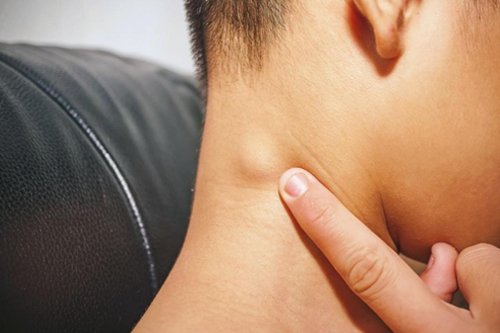Brain and ENT Clinic – Dr Lalit Mahajan In Nagpur & Dr Rachna Gangwani Mahajan In Nagpur
Swollen Lymph Nodes in Nagpur

Swollen Lymph Nodes in Nagpur, also known as lymphadenopathy, refer to an enlargement or inflammation of lymph nodes. Lymph nodes are small, bean-shape structures that play a crucial role in the immune system.
They are part of the lymphatic system, which helps filter and circulate lymph fluid throughout the body, removing waste products, pathogens, and abnormal cells.
When lymph nodes detect the presence of foreign substances, such as bacteria, viruses, or abnormal cells, they may become activate and enlarge. This enlargement is a sign that the lymph nodes are working to fight off the infection or respond to other immune challenges.
Symptoms of swollen lymph nodes
Enlarge Nodes:
- Swollen or enlarge lymph nodes are the primary symptom. The size increase may be noticeable, and the nodes may feel tender or painful to the touch.
Tenderness or Pain:
- Swollen lymph nodes can be tender or painful, especially when pressure is applied or during movement.
Location:
- The location of the swollen lymph nodes can provide clues to the underlying cause. Common areas include the neck, under the jaw, in the armpits, and in the groin.
Redness or Warmth:
- The skin over the swollen nodes may appear red or feel warm to the touch.
Mobility:
- Healthy lymph nodes can typically move freely under the skin. If nodes become fix or immobile, it may be a cause for concern.
Systemic Symptoms:
- Swollen lymph nodes are often a sign of an immune response. Depending on the cause, individuals may experience other symptoms such as fever, fatigue, night sweats, or unexplain weight loss.
Treatment Process for Swollen Lymph Nodes
Address Infections:
- If the swollen lymph nodes are due to a bacterial infection, antibiotics may be prescribe. Viral infections may not respond to antibiotics, but supportive care, rest, and antiviral medications (if applicable) may be recommend.
Pain Relief and Symptom Management:
- Over-the-counter pain relievers, such as acetaminophen or ibuprofen, may be recommended to alleviate pain and reduce inflammation associated with swollen lymph nodes. Warm compresses applied to the affected area can also help.
Rest and Hydration:
- Adequate rest and staying hydrated are essential for supporting the body’s immune response and overall well-being.
Monitoring and Follow-up:
- Monitoring the progress of symptoms is crucial. If the swelling persists, increases, or is associated with concerning symptoms, further evaluation and follow-up with a healthcare professional may be necessary.
Treatment of Underlying Conditions:
- If swollen lymph nodes are associated with chronic conditions such as autoimmune disorders or cancers, treatment will be directed toward managing the underlying condition. This may involve medications, immunotherapy, chemotherapy, or other specialized treatments.
Surgical Intervention:
- In some cases, especially if an infection is localized or if there are concerns about the possibility of cancer, a healthcare professional may recommend a biopsy or surgical removal of the affected lymph node for further evaluation.
What can I do at home to treat swollen lymph nodes?
Warm Compress:
- Apply a warm compress to the affected area for about 15-20 minutes several times a day. This may help reduce swelling and ease discomfort.
Stay Hydrated:
- Drink plenty of fluids, such as water and herbal teas, to stay hydrated. Proper hydration supports the immune system and helps flush out toxins.
Rest:
- Ensure you get enough rest to allow your body to recover. Adequate sleep is crucial for overall immune system function.
Over-the-Counter Pain Relievers:
- Non-prescription pain relievers, such as acetaminophen (Tylenol) or ibuprofen (Advil, Motrin), can help alleviate pain and reduce inflammation. Always follow the recommended dosage and guidelines.
Good Hygiene Practices:
- Practice good hygiene, including regular handwashing, to prevent the spread of infections that could contribute to swollen lymph nodes.
Avoid Irritants:
- If your swollen lymph nodes are due to an infection, avoiding irritants such as smoking or exposure to strong odors may help prevent further irritation.
Elevate the Affected Area:
- If possible, elevate the affected area to reduce swelling. For example, if the swollen lymph nodes are in the neck, use an extra pillow when sleeping.
Gargle with Warm Saltwater:
- For swollen lymph nodes in the neck and throat, gargling with warm saltwater may help soothe the area. Mix about half a teaspoon of salt in a glass of warm water.
